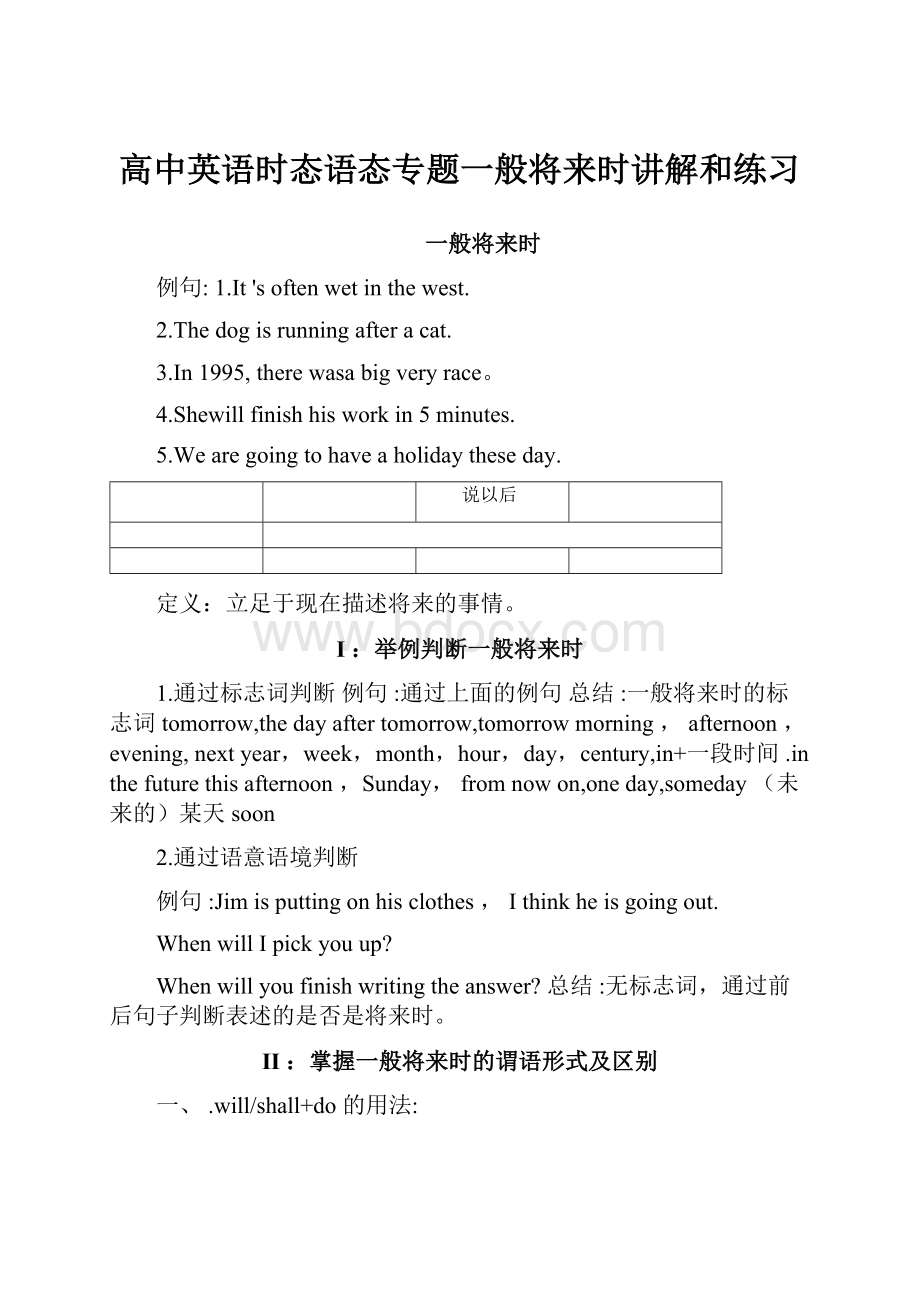高中英语时态语态专题一般将来时讲解和练习.docx
《高中英语时态语态专题一般将来时讲解和练习.docx》由会员分享,可在线阅读,更多相关《高中英语时态语态专题一般将来时讲解和练习.docx(18页珍藏版)》请在冰豆网上搜索。

高中英语时态语态专题一般将来时讲解和练习
一般将来时
例句:
1.It'softenwetinthewest.
2.Thedogisrunningafteracat.
3.In1995,therewasabigveryrace。
4.Shewillfinishhisworkin5minutes.
5.Wearegoingtohaveaholidaytheseday.
说以后
定义:
立足于现在描述将来的事情。
I:
举例判断一般将来时
1.通过标志词判断例句:
通过上面的例句总结:
一般将来时的标志词tomorrow,thedayaftertomorrow,tomorrowmorning,afternoon,evening,nextyear,week,month,hour,day,century,in+一段时间.inthefuturethisafternoon,Sunday,fromnowon,oneday,someday(未来的)某天soon
2.通过语意语境判断
例句:
Jimisputtingonhisclothes,Ithinkheisgoingout.
WhenwillIpickyouup?
Whenwillyoufinishwritingtheanswer?
总结:
无标志词,通过前后句子判断表述的是否是将来时。
II:
掌握一般将来时的谓语形式及区别
一、.will/shall+do的用法:
例句:
Kidswillstudyathomeoncomputers.孩子们将通过电脑在家中学习。
Peoplewon'tusemone人y.们将不使用金钱。
ShallIgooutforawalk?
我可以出去散步吗?
总结:
will适用于所有人称,而shall只适用于第一人称I和we。
在疑问句中,主语为第人称(I和we)时,用助动词shall。
事物的固有属性或必然趋势。
注意:
表示未经事先考虑而将要发生的情况,但是如果不清楚是否须先考虑还是未考虑的意图时,两者都可用。
〈练习〉:
1.Putyourhandsbehindyourback.Don'tspeak.We'llintenminutes.
A.backB.bebackC.arebackD.arebacktoyou
答案:
B
思路分析:
根据“'l可l知”后接动词原形,故选B项。
2.We'regladtohearthattheGreenstoanewflatnextweek.
A.moveB.movedC.willmoveD.havemoved
答案:
C
思路分析:
根据nextweek可知时态用一般将来时,故选C项。
3.ThereatalkbyYangLiweitomorrowmorninginourschool,
A.wasB.willbeC.haveD.has
答案:
B
思路分析:
根据There可知是考查Therebe的正确形式;tomorrowmorning表示将来,故用一般将来时,B项正确。
二、.begoingtodo
例句:
I'mgoingtostudycomputerscienc我e.打算学习电脑科学Howareyougoingtodothat?
你打算怎么去做?
WearegoingtovisittheparknextSunday.
Itisgoingtorain.
表示单纯的将来,通常是指事情在不久的将来就要发生,常用在口语中。
Whatisgoingtohappen?
什么事将会发生呢?
表示现在的打算,指人们现在打算将要做某事。
I'mgoingtobeanactor.我打算当一名演员。
★★表示估计或预料,指根据现在的客观情况或已有的迹象,推测某种事态将会发生,而且进程已经开始。
Lookattheblackclouds.It'
rain.
看那些乌云,天快下雨了。
总结:
goingto
说一说区别willdo和begoinngtodo
一、在表示将来发生的事情时,二者的区别主要是:
1、begoingto用于主观判断,及说话人主观上计划或安排将要去做的事情.will则多用于客观的情况,即客观上将要发生的事情.例如:
I'mnotgoingtoaskhe我r.不打算去问她.
Itwillberainytomorrow.明天会下雨.
2、begoingto表示近期、眼下就要发生的事情,will表示的将来时间则较远一些.例如:
He'sgoingtodoitrightaway.他马上就去做.
Willshearriveontimenexttime?
下次她会按时到吗?
二、可表示说话人按照他的意图将要发生或进行的动作时,各有侧重:
若表示没有经过事先计划或考虑,而是在说话的当时临时想到的意图或临时作出的决定时,则要用will.若表示经过事先考虑好的意图时,要用begoingto.
例如:
I'llanswerthetelephon我e去.接电话.(事先没经过考虑)
I'mgoingtomeethimattherailwaystation我.去火车站接他.(已经过考虑)
三、在有条件从句的主句中一般不用begoingto,而多用will,因为此时多少带有些意愿.例如:
Iwon'tgoifhedoesn
他'不tc来om,我e.就不去.
c来om
四、在正式的通知(如新闻媒体公布的官方消息,气象预报等)中用will结构.例
如:
Ji'anwillbecloudywiththetemperaturefromeighteentotwe-netiyght.吉安阴,气温十八到二十八摄氏度.
五、表示有迹象表明要发生某事,只用begoingto,不用will.
例如:
Lookattheclouds,it'sgoingtobeanotherstorm.
【直通高考】
1.(2012天津一中高一上学期期末)–Tom,youleftthelightsintheclassroomon.
–Oh,sorry,Itoturnthemoff.Thanksforyourreminding.
A.willreturnB.amgoingtoreturnC.amreturningD.return
【答案】:
A
【解析】:
试题分析:
考查时态:
句意:
--汤姆,你没有关教室的灯。
--哦,对不起,我马上去关,谢谢提醒。
从句意看这是临时的决定,而不是计划好的,所以用willdo。
选A。
2.(天津市和平区2017届高三第四次质量调查)—UncleWangisinhospital.
—Oh,really?
I.Igoandvisither.
A.didn'tknow;amgoingtoB.hadn'tknown;would
C.haven'tknown;willD.didn'tknow;will
【答案】D【解析】考查时态。
根据句子,我不知道王叔叔在医院里,是过去不知道,所以要用一般过去时态,第一空用didn't;Igoandvisither是说我现在打算去
看她,amgoingto表示计划,打算做某事,will表个人意愿,现在是说话时打算去.
练习〉:
1.()Sheisgoingtoafterschool.
A.listeningtomusicB.listenstomusicC.listentomusicD.listenedtomusic
2.()WeinBeijingintwodays.
A.willarrivesB.arrivesC.aregoingtoarriveD.arriving
3.—Whyareyouinsuchahurry,John?
—ThereabasketballmatchbetweenClassThreeandourclassintenminutes.
A.isgoingtobeB.isgoingtohaveC.willhaveD.willhold
4.()Areyougoingtothirteenyearsoldnextyear?
A.willbeB.areC.beD.go
5.()Willyouatthebusstopat10:
30?
A.meetingB.meetsC.meetD.met
6.()LilyandItheguitar.nextweek.
A.amgoingtoplayB.aregoingtoplayC.willplaysD.play
三、.beabouttodo/beonthepointofdoing例句:
Weareabouttoleave.我们马上就走。
总结:
表示即将发生的动作,意为:
很快,马上,后面一般不跟时间状语。
四、.betodo例句:
①Arewetogoonwiththiswork我?
们继续干吗?
①Theboyistogotoschooltomorrow这.个男孩明天要去上学。
总结:
表示按计划要发生的事或征求对方意见。
五、特殊用法:
①①①
(一)现在进行时表示一般将来时例句:
1.Lookoutwhenyouarecrossingthestreet.
Don'twakehimupifheisstillsleepingat7tomorrowmorning.小结:
.在时间状语或条件状语从句中现在进行时表示一般将来时2.
MarryisleavingonFriday.Heisarrivingherenextweek.
5/18
小结:
动词go,comeleave,start,arrive等进行时表示在最近按计划或安排要进行的动作(这时多有表示将来的时间状语)。
(二)一般现在时表示一般将来时
1.例句:
Theplanetakesoffatfiveo'clockPm.
小结:
表示瞬间动作的动词如come、go、leave、arrive、fly、return、start、begin、open、close、end、stop等+具体的时间用一般现在时代替将来时,表示一个按规定、计划或安排要发生的动作。
2.例句:
Solongasheworkshard,Idon'tmindwhenhefinishestheexperiment.
Seetoitthatyouarehereontimetomorrow.
Wemustseetoitthatpartypoliciesarescientificandeffective.
Idon'tcarewhatotherssay.
小结:
在makesure(certain),seetoittha务t,必mind,care,matter+宾语从句,从句用一般现在时代替一般将来时。
3.例句:
Useyourheadandyouwillfindaway.
Studyharder,andyouwillpasstheexaminations.
小结:
祈使句+and/or+句子”,这种结构中and后面的句子谓语用一般将来时。
【直通高考】
1.(2017年和平区第二次质量调查)—IheardthatBobwasfiredbythecompany.
—Yes.Butdon'tmentionthiswhenyou___tohim.
A.talkedB.willtalkC.weretalkingD.aretalking
【答案】D
【解析】在时间状语从句中,现在进行时表示将来。
2.(2014十二区县高三模拟一)——HowcouldIapplyforacourseonline?
——Justfillonthisformandwewhatwecandoforyou.
A.seeB.areseeingC.haveseenD.willsee
【答案】:
D
【解析】:
考察固定句型和时态。
句意:
——我怎么申请网上课程?
——就填这个表格然后我们会看看能为你做些什么。
这里用了固定句型:
祈使句+and/or+简
单句(用一般将来时),故答案选D。
解题技巧:
“找标法”寻(找时间标志词)、
“呼应法”主(从句时态呼应)、
“搭配法”固(定搭配)、
“语境法”结(合语境,弄清时间的先后关系)
【直通高考】
1.(2012天津卷)ThethreeofusaroundEuropeforaboutamonthlast
summer.
A.travelledB.havetravelledC.hadtravelledD.travel
2.(2012天津卷)Thelettersforthebossonhisdeskbuthedidn'tread
themuntilthreelater.
A.wereputB.wasputC.putD.hasput
3.(2016天津)Whenwalkingdownthestreet,IcameacrossDavid,whenI
foryears.
A.didn'tseeB.haven'tseenC.hadn'tseenD.wouldn'tsee
4.(2016天津)Marywassilentduringtheearlypartofthediscussionbutfinallysheheropiniononthesubject.
A.gavevoicetoB.keptaneyeonC.turnedadeafearofD.setfooton
5.(2017年6月天津卷阅读理解B篇)Fifteenyearsago,ItookasummervacationinLecceinsouthernItaly.
6.(2017年3月天津卷)ThenumberoffirmssellingcomputersinthisregionsinceJanuary2012.
A.aredroppingB.isdroppingC.havedroppedD.hasdropped
7.(2017年3月天津卷任务型阅读)WalterwasalwayssittinginthesamechairwhenIcametovisit.Hewouldlookupandsmilewhenhesawmeandpatthechairnexttohimformetositdown.Helovedtotellmeabouthislostgoldenyearswhenhewasanexcellentbaseballplayer.Iwasagoodlistener.Afteracoupleofhoursoftalking,Iwouldshakehishandsandsaygoodbyetohim.IhopedthatIbroughtalittlesunshineintoWalter'slife.
WhatdidtheauthordoeverytimehevisitedWalter?
(nomorethan10words)
课堂总练习:
1.—Whatwouldyoudoifittomorrow?
—Wehavetocarryiton,sincewe'vegoteverythingready.
A.rainB.rainsC.willrainD.israining
2.—Whatareyougoingtodothisafternoon?
—Iamgoingtothecinemawithsomefriends.Thefilmquiteearly,sowe
tothebookstoreafterthat.
A.finished;aregoingB.finished;goC.finishes;aregoingD.finishes;go
3.Myyoungerbrotherbe15yearsoldnextyear.
A.isgoingtoB.willC.istoD.should
4.—Sorry,Iforgottoposttheletterforyou.
—Nevermind,postitmyselftonight.
A.I'mgoingtoB.IprefertoC.I'llD.I'drather
Heherabeautifulhatonhernextbirthday.
A.givesB.gaveC.willgivingD.isgoingtogiving
6.Hetousassoonashegetsthere.
A.writesB.haswrittenC.willwriteD.wrote
7.Heinthreedays.
A.comingbackB.camebackC.willcomebackD.isgoingtocoming
A.isn'trainB.won'trainC.doesn'trainD.doesn'tfine
9.Whoweswimmingwithtomorrowafternoon?
A.will;goB.do;goC.will;goingD.shall;go
10.Dr.Jacksonisnotinhisofficeatthemoment.
—Allright.Ihimlater.
willcallB.havecalledC.callDwillbecalling
11.Asyougothroughthisbook,youthateachofthemillionsofpeople
wholivedthroughWorldWarIIhadadifferentexperience.
A.willfindB.foundC.hadfoundD.havefound
12.Moreefforts,asreported,intheyearsaheadtoacceleratethesup-psliyde
structuralreform.
A.aremadeB.willbemadeC.arebeingmadeD.havebeenmade
13.Untilwehavediscussedallthedetails,nodecisionaboutanynew
operations.
A.ismadeB.willbemadeC.isbeingmadeD.hasbeenmade
14.—IheardthatBobwasfiredbythecompany.—Yes.Butdon'tmentionthiswhen
you___tohim.
A.talkedB.willtalkC.weretalkingD.aretalking
一般将来时真题演练
1.Inthenearfuture,moreadvancesintherobottechnologybyscientists.
A.aremakingB.aremadeC.willmakeD.willbemade
【答案】:
D【解析】:
考察时态和语态。
句意:
在不久的将来,科学家们将会在机器人技术方面取得更大的进步。
根据时间状语inthenearfuture可以确定该句的时态为一般将来时,而句子的主语是moreadvances,和make之间是被动关系,故选D。
2.—HowcouldIapplyforacourseonline?
——Justfillonthisformandwewhatwecandoforyou.
A.seeB.areseeingC.haveseenD.willsee
【答案】:
D
【解析】:
考察固定句型和时态。
句意:
——我怎么申请网上课程?
——就填这个表格然后我们会看看能为你做些什么。
这里用了固定句型:
祈使句+and/or+简单句(用一般将来时),故答案选D。
3.—DoyouthinkMomandDadlate?
——No,Swissairisusuallyontime.
A.wereB.willbeC.wouldbeD.havebeen
【答案】:
B
【解析】:
考察时态。
句意:
从句意看,是对将来情况的一种推测,故应该用一般将来时态。
句意:
—你认为爸妈会晚到吗?
—不,瑞士航班总是准点。
故答案选